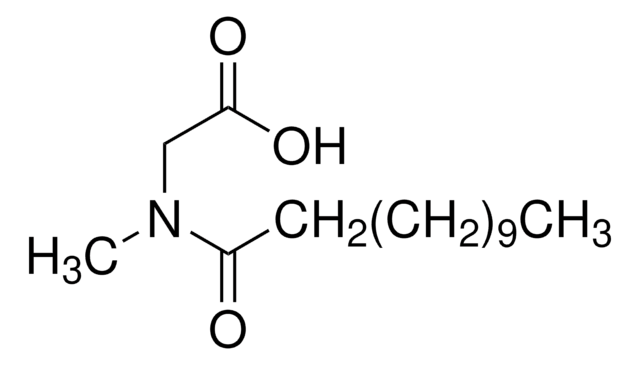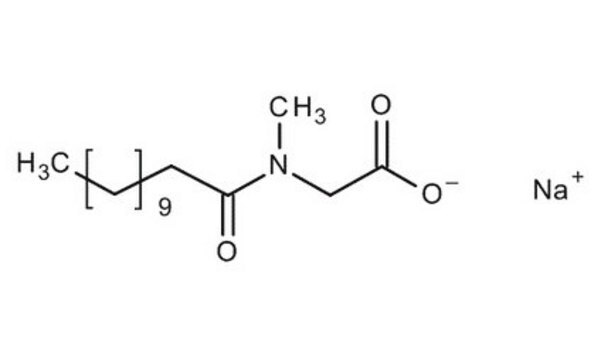L5125
N-Lauroylsarcosine sodium salt
≥94%
Synonyme(s) :
N-Dodecanoyl-N-methylglycine sodium salt, Sarkosyl NL
About This Item
Produits recommandés
Description
anionic
Pureté
≥94%
Forme
powder
Poids mol.
micellar avg mol wt 600
average mol wt 600
Nombre d'agrégation
2
Technique(s)
oligo synthesis: suitable
CMC
14.6 mM (20-25°C)
Solubilité
H2O: 100 mg/mL, clear to slightly hazy, colorless to faintly yellow
Chaîne SMILES
[Na+].CCCCCCCCCCCC(=O)N(C)CC([O-])=O
InChI
1S/C15H29NO3.Na/c1-3-4-5-6-7-8-9-10-11-12-14(17)16(2)13-15(18)19;/h3-13H2,1-2H3,(H,18,19);/q;+1/p-1
Clé InChI
KSAVQLQVUXSOCR-UHFFFAOYSA-M
Vous recherchez des produits similaires ? Visite Guide de comparaison des produits
Catégories apparentées
Application
Actions biochimiques/physiologiques
Autres remarques
Mention d'avertissement
Danger
Mentions de danger
Conseils de prudence
Classification des risques
Acute Tox. 2 Inhalation - Eye Dam. 1 - Skin Irrit. 2
Code de la classe de stockage
6.1B - Non-combustible acute toxic Cat. 1 and 2 / very toxic hazardous materials
Classe de danger pour l'eau (WGK)
WGK 1
Équipement de protection individuelle
Eyeshields, Gloves, type N95 (US)
Certificats d'analyse (COA)
Recherchez un Certificats d'analyse (COA) en saisissant le numéro de lot du produit. Les numéros de lot figurent sur l'étiquette du produit après les mots "Lot" ou "Batch".
Déjà en possession de ce produit ?
Retrouvez la documentation relative aux produits que vous avez récemment achetés dans la Bibliothèque de documents.
Les clients ont également consulté
Notre équipe de scientifiques dispose d'une expérience dans tous les secteurs de la recherche, notamment en sciences de la vie, science des matériaux, synthèse chimique, chromatographie, analyse et dans de nombreux autres domaines..
Contacter notre Service technique








